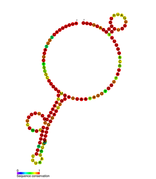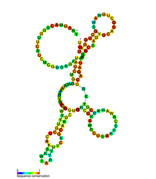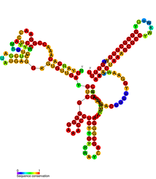Hfq binding sRNA
Appearance
| isrA Hfq binding RNA | |
|---|---|
 Predicted secondary structure of isrA Hfq binding RNA | |
| Identifiers | |
| Symbol | isrA |
| Rfam | RF01385 |
| Other data | |
| RNA type | gene, sRNA |
| Domain(s) | Enterobacteriaceae |
| PDB structures | PDBe |

An Hfq binding sRNA is an sRNA that binds the bacterial RNA binding protein called Hfq. A number of bacterial small RNAs which have been shown to bind to Hfq have been characterised (see list). Many of these RNAs share a similar structure composed of three stem-loops.[1] Several studies have expanded this list, and experimentally validated a total of 64 Hfq binding sRNA in Salmonella Typhimurium.[2][3][4] A transcriptome wide study on Hfq binding sites in Salmonella mapped 126 Hfq binding sites within sRNAs.[5] Genomic SELEX has been used to show that Hfq binding RNAs are enriched in the sequence motif 5'-AAYAAYAA-3'.[6]
Bacterial Hfq binding sRNAs
References
- ^ Zhang A, Wassarman KM, Rosenow C, Tjaden BC, Storz G, Gottesman S (2003). "Global analysis of small RNA and mRNA targets of Hfq". Mol. Microbiol. 50 (4): 1111–24. doi:10.1046/j.1365-2958.2003.03734.x. PMID 14622403.
{{cite journal}}: CS1 maint: multiple names: authors list (link) - ^ Pfeiffer V, Sittka A, Tomer R, Tedin K, Brinkmann V, Vogel J (December 2007). "A small non-coding RNA of the invasion gene island (SPI-1) represses outer membrane protein synthesis from the Salmonella core genome". Molecular Microbiology. 66 (5): 1174–91. doi:10.1111/j.1365-2958.2007.05991.x. PMID 17971080.
{{cite journal}}: CS1 maint: multiple names: authors list (link) - ^ Sittka A, Lucchini S, Papenfort K, et al. (2008). Burkholder WF (ed.). "Deep Sequencing Analysis of Small Noncoding RNA and mRNA Targets of the Global Post-Transcriptional Regulator, Hfq". PLOS Genetics. 4 (8): e1000163. doi:10.1371/journal.pgen.1000163. PMC 2515195. PMID 18725932.
{{cite journal}}: CS1 maint: unflagged free DOI (link) - ^ a b Padalon-Brauch G, Hershberg R, Elgrably-Weiss M, et al. (April 2008). "Small RNAs encoded within genetic islands of Salmonella typhimurium show host-induced expression and role in virulence". Nucleic Acids Research. 36 (6): 1913–27. doi:10.1093/nar/gkn050. PMC 2330248. PMID 18267966.
- ^ Holmqvist E, Wright PR, Li L, Bischler T, Barquist L, Reinhardt R, Backofen R, Vogel J (2016). "Global RNA recognition patterns of post-transcriptional regulators Hfq and CsrA revealed by UV crosslinking in vivo". EMBO J. doi:10.15252/embj.201593360. PMID 27044921.
{{cite journal}}: CS1 maint: multiple names: authors list (link) - ^ Lorenz C, Gesell T, Zimmermann B, Schoeberl U, Bilusic I, Rajkowitsch L, Waldsich C, von Haeseler A, Schroeder R (2010). "Genomic SELEX for Hfq-binding RNAs identifies genomic aptamers predominantly in antisense transcripts". Nucleic Acids Res. 38 (11): 3794–808. doi:10.1093/nar/gkq032. PMC 2887942. PMID 20348540.
{{cite journal}}: CS1 maint: multiple names: authors list (link)
Further reading
- De Lay, N.; Schu, D. J.; Gottesman, S. (2013). "Bacterial Small RNA-based Negative Regulation: Hfq and Its Accomplices". Journal of Biological Chemistry. 288 (12): 7996–8003. doi:10.1074/jbc.R112.441386. PMC 3605619. PMID 23362267.
{{cite journal}}: CS1 maint: unflagged free DOI (link) - Peng, Y.; Soper, T. J.; Woodson, S. A. (2013). "Positional effects of AAN motifs in rpoS regulation by sRNAs and Hfq". Journal of Molecular Biology. 426 (2): 275–85. doi:10.1016/j.jmb.2013.08.026. PMID 24051417.
External links

























